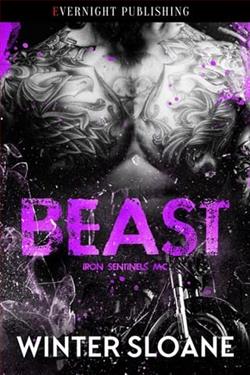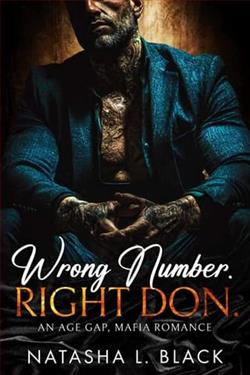Page 20 of Captive Virgin of the Bratva
My fingers shake, but they know what they’re doing.
The gauze peels away from Yuri’s thigh with a sickening wet sound, the fabric sticking to the flesh beneath like it doesn’t want to let go. I grit my teeth and peel slowly, steadily, the way I’ve done a hundred times before.
This isn’t the hospital. There’s no nurse beside me. No sterile tray of instruments. No hum of machines or overhead voices calling for bloodwork or vitals.
Only Kolya’s silence.
His presence looms behind me like a shadow stitched into my spine, unmoving, unreadable. I feel his eyes on me—piercing, clinical, and utterly devoid of trust. It’s like working with a blade pressed between my ribs. One wrong move, and I won’t get another chance.
The wound beneath the gauze is grotesque. The entry point is jagged—no clean line, just torn skin, bruised and bloated. The surrounding tissue is inflamed, hot, and weeping. Infection has already taken hold, and the smell tells me there’s necrosis setting in.
Days without proper treatment, maybe more. Whoever tried to patch him up before didn’t know what they were doing. Or they didn’t care.
I glance over my shoulder.
Kolya hasn’t moved. His hands are folded in front of him now, relaxed—but I know better. There’s nothing relaxed about him. He’s coiled steel wrapped in flesh and tailored fabric.
He’s not the kind of man who blinks when someone dies. He’s the kind who watches closely to make sure theyknowthey’re dying.
“Where’s the supplies I asked for?” I ask, keeping my voice steady.
The man from before—Boris—returns with a metal case. It’s dented, dusty, but when he sets it down beside me, I flip the lid open and feel my lungs loosen just slightly. Basic supplies. Antiseptic. Scissors. Sutures. A few vials of broad-spectrum antibiotics. Painkillers. Gloves.
Not ideal, but close enough.
I snap the gloves on with trembling hands, then reach for the antiseptic and gauze.
“Yuri,” I whisper, voice low and close to his ear. “If you can hear me, I need you to stay still. This is going to hurt.”
He doesn’t stir. Unconscious, then. Deep. Maybe too deep. That’s both a blessing and a curse.
I soak the gauze and begin to clean. The second the antiseptic hits, the wound hisses, bubbling faintly as it fights the infection. Pus leaks from the edges. I press harder, cleaning deep, careful not to open the wound more than it already is. Still, Yuri twitches, breath hitching as nerves spark reflexively.
I exhale slowly, focusing. For a moment, the world narrows to just my hands. Just the blood and the wound and the fragile thread of life tethering this man to consciousness.
But the weight never leaves my back.
Kolya hasn’t spoken since that one warning—If he dies, you die—but I feel it in every inch of the room. He’s watching everything. Measuring it. Measuring me.
How fast I move. How steady my hands are. How useful I am.
I finish cleaning and grab the syringe. The antibiotic’s thick, almost gel-like, and I jab it into the muscle above the wound, injecting slowly. Yuri stirs, his body recoiling weakly. A good sign. A sign his system isn’t fully shutting down.
Another breath. Another wipe. I start suturing where the skin has torn wide around the bullet path. It’s crude, but functional. I’ve worked in trauma wards. I’ve done this before, in chaos, in blood. But never like this. Neverfor my life.
I feel sweat bead down my spine despite the cold.
My hands are steady now, only because I’ve given them no other choice.
The silence stretches too long. I glance up again, unable to stop myself.
Kolya is closer now.
He’s moved forward silently, the way predators do. His arms are still folded, but his eyes are locked on mine—unblinking, unreadable, but no less sharp. It’s like being studied under a microscope. Like he’s trying to decide where to cut.
I don’t speak, neither does he.
I turn back to Yuri and finish the last stitch, cutting the thread with the small shears from the kit. I pack the wound, wrap it cleanly with new gauze, then sit back on my heels, chest rising and falling hard.















